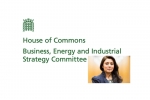
Yesterday bosses at regulator Ofgem were questioned by MPs on the Business Energy and Industrial Strategy Committee.
Last week the regulator raised the energy price cap by nearly £700 a year.
The session was part of the Select Committee’s new inquiry into energy pricing and the future of the energy market.
At the outset the Chairman of the Committee, Labour’s Darren Jones, likened the failings to the financial crisis in 2008 when the banks went bust and required taxpayers money.
Committee member, Nusrat Ghani said all she was hearing was “a bit too little, too late“. The Wealden MP asked the Chief Executive whether poor decision making led to customers paying higher bills?
During the session Chief Executive Jonathan Brearley admitted that the regulator had been too focused on increasing competition in an attempt to break-up the stranglehold of the so-called “big six” of British Gas, EDF, Eon, Npower, SSE and ScottishPower.
Mr Brearley said the regulator should have been “more careful” about the financial resilience of smaller suppliers entering the market over the past decade:
… there was concern about the fact that we had a small number of incumbents and huge concern that customers who weren’t switching, or indeed switching between them, were getting poor service and poor value for money.
So in my mind, it’s understandable why the regulator focussed on diversity. But what I accept is that alongside that, we should have been more careful about the financial resilience of those who were coming into the market.
Ofgem Chief Executive Jonathan Brearley
Nus Ghani MP also asked what the impact on energy prices if Russia were to invade Ukraine and gas supplies to Europe were impacted. She also quizzed them on whether the UK should be following the example set by Germany in reducing the “Green Levy” which funds renewable energy projects, as a way of lessening the impact of price rises on the consumer.
The bosses at Ofgem explained it was ultimately a decision for Government; but that levies are coming down already and could potentially start paying back to consumers because the “relative cost of renewables versus the cost of gas in the market today makes those technologies extremely cost effective”.
You can watch the session on Parliament TV (Nus Ghani MP from 10:40:51).

